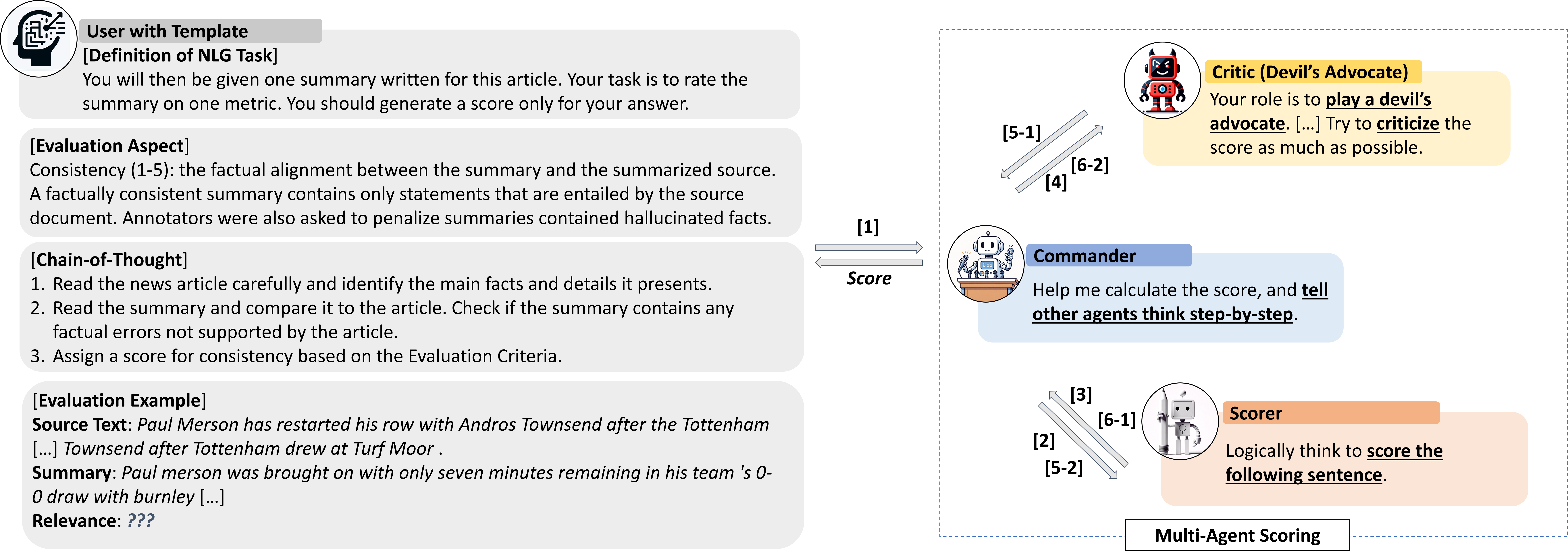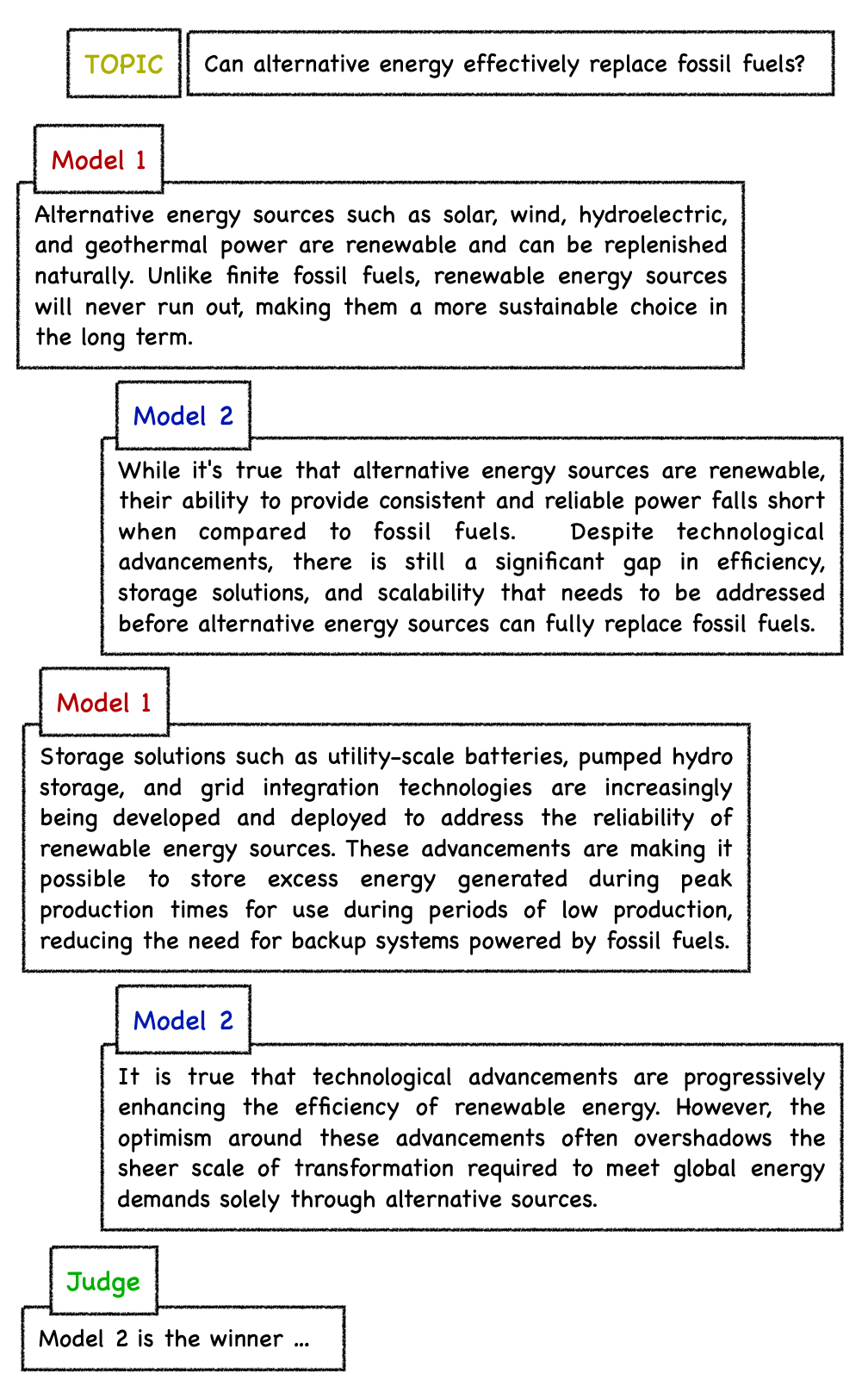DEBATE: Devil's Advocate-Based Assessment and Text Evaluation

0

Sign in to get full access
Overview
- The paper introduces a novel approach called "DEBATE" (Devil's Advocate-Based Assessment and Text Evaluation) for evaluating language models and text generation systems.
- DEBATE leverages a "devil's advocate" mechanism, where two models engage in a structured debate to assess the quality and capabilities of a target language model or text generation system.
- The authors demonstrate the effectiveness of DEBATE through various experiments and comparisons to existing evaluation frameworks, such as DeBERTa: Decoding-Enhanced BERT with Disentangled Attention and METAL: Towards Multilingual Meta-Evaluation.
Plain English Explanation
DEBATE is a new way to evaluate language models and text generation systems. It works by having two separate models engage in a structured debate, where one model takes the "devil's advocate" role and tries to find flaws or weaknesses in the target model or system. This back-and-forth debate helps uncover the true capabilities and limitations of the system being evaluated.
The key idea is that by having two models actively challenge each other, the evaluation process becomes more robust and comprehensive than traditional methods. This approach can help identify issues that might be overlooked in standard benchmarks or assessments.
For example, imagine you have a language model that can generate realistic-sounding news articles. Instead of just checking if the articles are grammatically correct or factually accurate, DEBATE would pit the model against another model that tries to poke holes in the generated content, looking for inconsistencies, biases, or other potential problems. This more rigorous evaluation can provide a deeper understanding of the model's strengths and weaknesses.
Technical Explanation
The DEBATE framework consists of two main components: a "Challenger" model and a "Defender" model. The Challenger model is tasked with finding flaws or weaknesses in the target system, while the Defender model tries to justify or explain the target system's behavior.
The debate process involves a series of iterative exchanges, where the Challenger and Defender take turns making arguments and providing evidence. The authors propose several debate strategies, such as identifying factual errors, logical inconsistencies, or biases in the target system's outputs.
To evaluate the effectiveness of DEBATE, the researchers conducted experiments on various language tasks, including MATEVAL: A Multi-Agent Discussion Framework for Advancing Open-Ended Evaluation and Evaluate What You Can't Evaluate: Unassessable Quality. They compared DEBATE's performance to other evaluation frameworks and found that it was able to identify more nuanced issues in the target systems.
Critical Analysis
The DEBATE framework offers a promising approach to evaluating language models and text generation systems, but it also has some potential limitations and challenges:
-
Complexity and Scalability: Implementing the DEBATE framework may be computationally intensive, as it requires training and coordinating two separate models. Scaling the approach to larger or more complex systems could be challenging.
-
Subjective Assessments: The outcomes of the debates may be somewhat subjective, as the performance of the Challenger and Defender models can be influenced by their specific training and design. Ensuring consistent and reliable assessments across different evaluations may be a concern.
-
Generalization and Transferability: It's unclear how well the insights gained from DEBATE evaluations can be generalized or transferred to other language models or text generation systems. The framework may be tailored to specific use cases or domains.
-
Bias and Fairness: While DEBATE can potentially uncover biases in target systems, the framework itself may introduce new biases or fairness concerns, depending on how the Challenger and Defender models are designed and trained.
Researchers may want to further investigate these potential issues and explore ways to address them, such as developing more robust and standardized evaluation protocols or exploring ways to improve the objectivity and generalizability of DEBATE assessments.
Conclusion
The DEBATE framework represents a novel and promising approach to evaluating language models and text generation systems. By leveraging a structured debate between two models, DEBATE can provide a more comprehensive and nuanced assessment of a target system's capabilities and limitations.
The findings from DEBATE evaluations could have important implications for the development and deployment of language AI systems, helping to ensure they are more reliable, unbiased, and aligned with human values. As the field of natural language processing continues to advance, tools like DEBATE will become increasingly crucial for maintaining the integrity and trustworthiness of these powerful technologies.
This summary was produced with help from an AI and may contain inaccuracies - check out the links to read the original source documents!
Related Papers


0
DEBATE: Devil's Advocate-Based Assessment and Text Evaluation
Alex Kim, Keonwoo Kim, Sangwon Yoon
As natural language generation (NLG) models have become prevalent, systematically assessing the quality of machine-generated texts has become increasingly important. Recent studies introduce LLM-based evaluators that operate as reference-free metrics, demonstrating their capability to adeptly handle novel tasks. However, these models generally rely on a single-agent approach, which, we argue, introduces an inherent limit to their performance. This is because there exist biases in LLM agent's responses, including preferences for certain text structure or content. In this work, we propose DEBATE, an NLG evaluation framework based on multi-agent scoring system augmented with a concept of Devil's Advocate. Within the framework, one agent is instructed to criticize other agents' arguments, potentially resolving the bias in LLM agent's answers. DEBATE substantially outperforms the previous state-of-the-art methods in two meta-evaluation benchmarks in NLG evaluation, SummEval and TopicalChat. We also show that the extensiveness of debates among agents and the persona of an agent can influence the performance of evaluators.
Read more5/27/2024


0
Evaluating the Performance of Large Language Models via Debates
Behrad Moniri, Hamed Hassani, Edgar Dobriban
Large Language Models (LLMs) are rapidly evolving and impacting various fields, necessitating the development of effective methods to evaluate and compare their performance. Most current approaches for performance evaluation are either based on fixed, domain-specific questions that lack the flexibility required in many real-world applications where tasks are not always from a single domain, or rely on human input, making them unscalable. We propose an automated benchmarking framework based on debates between LLMs, judged by another LLM. This method assesses not only domain knowledge, but also skills such as problem definition and inconsistency recognition. We evaluate the performance of various state-of-the-art LLMs using the debate framework and achieve rankings that align closely with popular rankings based on human input, eliminating the need for costly human crowdsourcing.
Read more6/18/2024


0
DebateQA: Evaluating Question Answering on Debatable Knowledge
Rongwu Xu, Xuan Qi, Zehan Qi, Wei Xu, Zhijiang Guo
The rise of large language models (LLMs) has enabled us to seek answers to inherently debatable questions on LLM chatbots, necessitating a reliable way to evaluate their ability. However, traditional QA benchmarks assume fixed answers are inadequate for this purpose. To address this, we introduce DebateQA, a dataset of 2,941 debatable questions, each accompanied by multiple human-annotated partial answers that capture a variety of perspectives. We develop two metrics: Perspective Diversity, which evaluates the comprehensiveness of perspectives, and Dispute Awareness, which assesses if the LLM acknowledges the question's debatable nature. Experiments demonstrate that both metrics align with human preferences and are stable across different underlying models. Using DebateQA with two metrics, we assess 12 popular LLMs and retrieval-augmented generation methods. Our findings reveal that while LLMs generally excel at recognizing debatable issues, their ability to provide comprehensive answers encompassing diverse perspectives varies considerably.
Read more8/6/2024


0
Can LLMs Beat Humans in Debating? A Dynamic Multi-agent Framework for Competitive Debate
Yiqun Zhang, Xiaocui Yang, Shi Feng, Daling Wang, Yifei Zhang, Kaisong Song
Competitive debate is a complex task of computational argumentation. Large Language Models (LLMs) suffer from hallucinations and lack competitiveness in this field. To address these challenges, we introduce Agent for Debate (Agent4Debate), a dynamic multi-agent framework based on LLMs designed to enhance their capabilities in competitive debate. Drawing inspiration from human behavior in debate preparation and execution, Agent4Debate employs a collaborative architecture where four specialized agents, involving Searcher, Analyzer, Writer, and Reviewer, dynamically interact and cooperate. These agents work throughout the debate process, covering multiple stages from initial research and argument formulation to rebuttal and summary. To comprehensively evaluate framework performance, we construct the Competitive Debate Arena, comprising 66 carefully selected Chinese debate motions. We recruit ten experienced human debaters and collect records of 200 debates involving Agent4Debate, baseline models, and humans. The evaluation employs the Debatrix automatic scoring system and professional human reviewers based on the established Debatrix-Elo and Human-Elo ranking. Experimental results indicate that the state-of-the-art Agent4Debate exhibits capabilities comparable to those of humans. Furthermore, ablation studies demonstrate the effectiveness of each component in the agent structure.
Read more8/21/2024